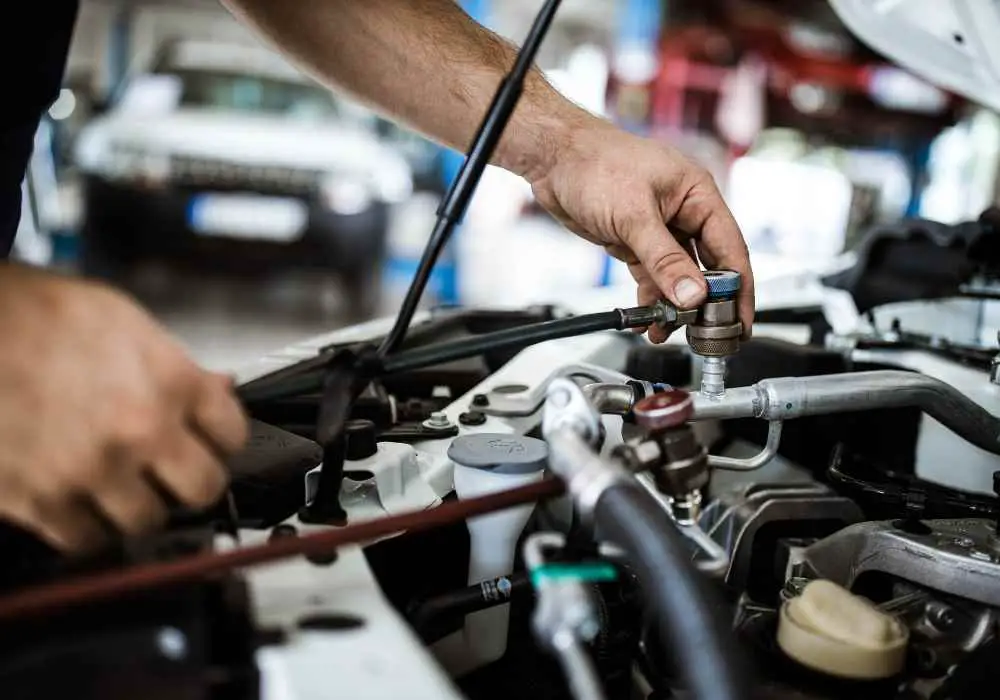If you’ve ever experienced the annoyance of a loud and noisy car AC compressor, you’re not alone.

While the noise can be a nuisance, it is often an indication of a problem with the compressor that should be addressed.
In this article, we’ll go over the possible causes of car AC compressor noise and the steps you can take to quiet it down.
Possible Causes of Car AC Compressor Noise:
There are several possible causes of noise in a car AC compressor. Some of the most common include:
Loose or Worn Belts:
The belts that connect the compressor to the engine can become loose or worn over time, causing them to slip and create noise.
Faulty Compressor Bearings:
The bearings in the compressor can also become worn or damaged, leading to noise when the compressor is in use.
Obstructions in the Compressor:
Debris or other obstructions can get trapped in the compressor, causing it to make noise as it tries to operate.
Low Refrigerant Levels:
If the refrigerant levels in the AC system are low, the compressor may make noise as it struggles to function without sufficient fluid.
Steps to Take to Quiet a Noisy Car AC Compressor:
The first step in quieting a noisy car AC compressor is to diagnose the root cause of the noise. Here are some steps you can take to do so:
Check for Loose or Worn Belts:
Start by visually inspecting the belts that connect the compressor to the engine. If they are visibly worn or frayed, or if they seem to be slipping, they may be the cause of the noise. To fix this issue, you’ll need to either tighten the belts or replace them.
Check the Compressor Bearings:
If the belts appear to be in good condition, the problem may be with the compressor bearings. To check the bearings, you’ll need to remove the compressor from the car and disassemble it. Once you have access to the bearings, spin them by hand.
If they feel rough or make noise as they spin, they are likely the cause of the compressor noise and will need to be replaced.
Clear Any Obstructions:
If the belts and bearings seem to be in good condition, the problem may be due to debris or other obstructions trapped in the compressor. To fix this issue, you’ll need to remove the obstructions and clean out the compressor.
Check and Refill Low Refrigerant Levels:
If the compressor is making noise and none of the above issues seem to be the cause, the problem may be low refrigerant levels.
To fix this, you’ll need to locate the low-pressure port on the AC system and attach a refrigerant charging hose to it. Follow the instructions on the refrigerant can to properly refill the system.
By following these steps and addressing the root cause of the noise, you should be able to quiet a noisy car AC compressor and get your AC system running smoothly again.
Tips for Preventing Future Noise:
Regular maintenance can help prevent future noise issues with the car AC compressor. Some tips for maintaining the compressor and keeping it running smoothly include:
Replacing the belts on a regular basis:
The belts that connect the compressor to the engine can become worn over time, leading to slipping and noise. By replacing the belts on a regular basis, you can prevent this issue from occurring.
Keeping the compressor and its surrounding area clean:
Debris and other obstructions can get trapped in the compressor and cause noise. To prevent this, make sure to keep the compressor and its surrounding area clean and free of debris.
Conclusion:
In conclusion, car AC compressor noise can be a nuisance, but it is often an indication of a problem with the compressor that should be addressed.
By following the steps outlined in this article and performing regular maintenance, you can quiet a noisy car AC compressor and keep your AC system running smoothly.
Remember to address the issue promptly, as ignoring it can lead to further problems and costly repairs down the line.
Can I fix a noisy car AC compressor myself?
In many cases, it is possible to fix a noisy car AC compressor yourself. The steps outlined in the article, such as tightening or replacing belts and checking and refilling low refrigerant levels, can often be completed by a mechanically inclined individual.
However, if the issue is more complex, such as faulty compressor bearings, it may be necessary to bring the car to a mechanic for repair.
How do I know if my car AC compressor is faulty?
One of the most common indications of a faulty car AC compressor is noise. If the compressor is making unusual noises, such as squealing, grinding, or knocking, it may be faulty and in need of repair or replacement.
Other signs of a faulty compressor include a lack of cold air or an AC system that is not functioning properly.
Can low refrigerant levels cause a noisy car AC compressor?
Yes, low refrigerant levels can cause a noisy car AC compressor. The compressor relies on sufficient levels of refrigerant to function properly, and if the levels are low, it may struggle to operate and make noise as a result.
Is it normal for a car AC compressor to make some noise?
It is normal for a car AC compressor to make some noise when it is in use, but excessive or unusual noise is typically a sign of a problem.
If you notice an increase in noise from your AC compressor, it is important to address the issue promptly to prevent further problems.